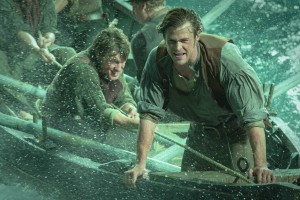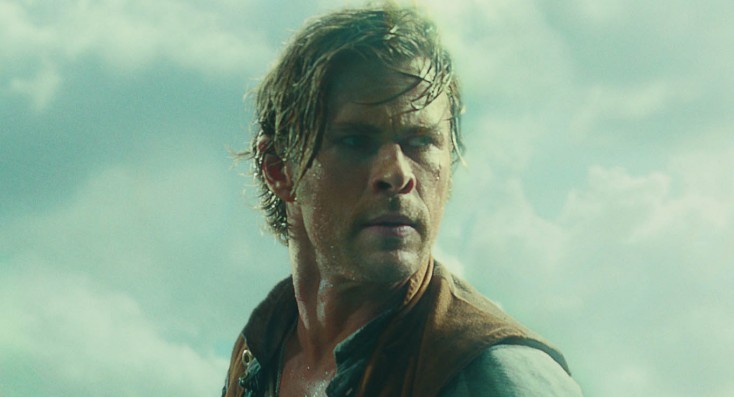
(l-r) Sam Keeley as Ramsdell and Chris Hemsworth as Owen Chase in IN THE HEART OF THE SEA. ©Warner Bros. Entertainment. Cr: Jonathan Prime.
By ANGELA DAWSON
Front Row Features
NEW YORK—Chris Hemsworth trades his hammer for a harpoon as the star of “In the Heart of the Sea,” based on the true story that inspired Herman Melville to write “Moby-Dick.”
The Aussie actor, best known for his role as Marvel superhero Thor, faces a formidable opponent in a bull sperm whale that upends his ship, the Essex, stranding the surviving crewmen on tiny whaleboats for 90 days a thousand miles away from land, in the Ron Howard-directed film.
Howard had long desired to make a big “water film,” and he believed Hemsworth was just the actor to play the adventure drama’s determined protagonist, Owen Chase, a seasoned New England whaler who is none to happy to serve under an untested captain. Sent on an expedition to bring back as many barrels of whale oil the ship can hold, the Essex crew soon finds itself in trouble. After the ship is damaged in a storm, the captain orders his crew to head out farther into the ocean to find more whales to harvest instead of returning home. Eventually finding a large pod of the whales, Chase harpoons a 100-foot long whopper, and the fight between man and beast becomes personal, and the real struggle for survival begins.
“There is something about the power and mystery of the ocean,” says Howard, who won Oscars for producing and directing 2001’s “A Beautiful Mind.” He figured he had a chance to demystify the mythology of the classic tale of man vs. nature on film, and Hemsworth was “born to play” the hero.
As part of their preparation for water-bound roles, Hemsworth and co-stars Benjamin Walker, Cillian Murphy, Tom Holland and others went to sailing school. They also dropped a lot of weight to play their characters as time passes without a rescue. Ben Whishaw plays Melville, who is reluctantly told the story decades later by Tom Nickerson, one of the ship’s survivors (played by Brendan Gleeson).
Hemsworth explained at a press conference why he connected with the material and wanted to help tell the real story behind the classic tale.
Q: Did you ever read “Moby-Dick”?
Hemsworth: I started reading it and Ron said, “Skim through it.” I read the parts in red but (Nathanial Philbrick’s 2010 historical book about the 1820 event) “In the Heart of the Sea: The Tragedy of the Whaleship Essex” was the bible for me. “Moby-Dick” was the fictionalized version of it.
Q: How did you physically transform for the harrowing later scenes in the movie? What was the hardest day on the water for you? Did you ever think, “Am I going to make it through this movie?”
Hemsworth: From the beginning we all had a goal to get to; to look as skinny as possible and as beat to hell as we could possibly make ourselves look, so we started on a normal diet and reduced that intake each week until the last couple of weeks where it was down to 500-600 calories (a day), or something, which is a pretty ugly experience. That led to some interesting mood swings and inconsistent patterns of emotion—that my wife can vouch for—which were negative. (He chuckles.) But, what was kind of great in that was we were all doing it together so there was certainly an opportunity for us to form this great bond and camaraderie between us. It was one that we might not have found in such depth had we not had that experience together.
Q: What was the hardest day on the water for you? Did you ever think, “Am I going to make it through this movie?” Was it on the ocean?
Hemsworth: Actually, the stuff in the ocean I kind of loved. It was difficult in the whaleboats because, just logistically, getting on and off of them was so tricky, and that was when we were at our hungriest. You’d be sitting in the hot, beating sun and you are either soaking wet or dry and you’ve got the beards glued on and falling off. It was kind of uncomfortable but I’ve got to say, being out in the ocean and that period of the shoot I did kind of love, as challenging as it was.
The hardest stuff I thought was in the (water) tank in London because it was freezing and there were a lot of night shoots. We basically felt like we were at a theme park from hell, being shot with water cannons and flipped out of boats. Ron would be on the loudspeaker and we just couldn’t hear him. It was chaos. We thought the stuff on the ocean was going to be trickier but I think the stuff in the studio ended up being more challenging because you are dealing with all the machines whereas on the ocean, you just had to adapt to whatever the environment was doing and get on with it, which was nice.
Q: What were you actually eating that you called “hardtack”? It looks like a dry biscuit?
Hemsworth: The hardtack was amazing. It tasted like gingerbread or something. It was a prop and we aren’t supposed to eat the props on set. In this one scene, I’ve got this little box of it and I’m supposed to break off a piece and have it, and I’m like, “This is delicious!” So, in between takes, I’m chewing and saying, “This is awesome!” The props guys were like, “We don’t have much. Stop eating it.” I’m like, “it’s fine.” We kept sneaking more and more of it. Later, I had a piece and thought, “This is horrible,” but, in that state (of extreme dieting), it was delicious.
Q: Did you feel a need to be the leader among the actors?
Hemsworth: I remember Ron saying at the beginning, “You kind of have to be an example. Everybody is going to be hungry and tired, so lead the charge and keep everyone positive.” The other guys had already been together for two or three weeks and I’d been shooting something else so I came in late and kind of felt anxious about being the new guy at school who had to play the leader of the group. But everybody already had the same passion and excitement and wanted to do the story justice, so I felt part of a tight unit.
Q: What were your fishing skills like before the film and has your relationship to sea creatures changed after this movie?
Hemsworth: I thought, “Who is going to teach me how to harpoon a whale? Who is a professional to show us that? Nobody.” There wasn’t someone to teach us that but there were old films (depicting harpooning).
Q: You are famous now for your role as Thor. When you aren’t doing “Thor” or “Avengers” films, do you look for something totally different to do?
Hemsworth: Yeah. I’m always looking for something different to contrast with the last thing I’ve done. It’s more for my own interests and what I’m passionate about. The only way you can do something justice is if you are in love with the material and have a passionate opinion about it. When things start to feel familiar is when it gets dangerous and you can get lazy.
On this one, there is the visual adventure epic all this is set in but, at the heart of it, there is also the relationships between these men and the horrific circumstances they endured and the effect that had on them afterwards that changed them from who they were prior to these events.
There were a lot of complexities and interesting character traits and ideas and questions raised. Very simply, I just loved the script. I try to hang on to that first impulse before I try to dissect it and ask why. I remember being swept away in the story and still thinking about it afterwards. I got the script around when I was doing “Snow White and the Huntsman.” Ron and I had worked together on “Rush.” He asked if I had anything else I wanted to you and I said yes, so let’s give it a go again.





